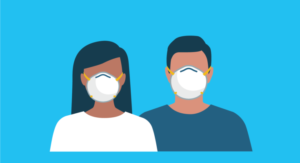
By Kathy Hubbard
We all know that the Centers for Disease Control and Prevention recommends wearing a mask when we can’t distance ourselves from others to the tune of more than six feet. The simple science says that if my face is covered and your face is covered, the droplets that contain the coronavirus are unlikely to be exchanged.
I don’t know about you, but I don’t want to get sick. Therefore I always wear a mask when I’m out in public. And, I do it for two simple reasons: you and me. I have no way to know if the person standing next to me has the virus and, forty percent of them don’t either. Yes, that’s the estimated percentage of asymptomatic people.
In a letter to the editor of this newspaper on Sunday, August 2, a man said that he had a concern about “being around individuals wearing bacteria-infested possibly infectious face masks.” If he’s reading, I’d like to start by explaining the difference between bacteria and viruses.
“Bacterial and viral infections have many things in common. They are both types of infections caused by microbes – bacteria and viruses, respectively – and spread by things such as coughing and sneezing, kissing, sex, contact with contaminated surfaces, food and water, and contact with infected creatures such as pets, livestock, and insects.” WebMD explains.
“Although bacteria and viruses are both too small to be seen without a microscope, they’re as different as giraffes and goldfish. Most bacteria are harmless, and some help by digesting food, destroying disease-causing microbes, fighting cancer cells, and providing essential nutrients. Fewer than one percent of bacteria cause diseases in people.
“Viruses can only reproduce by attaching themselves to cells. Also, unlike bacteria, most viruses do cause disease, and they’re quite specific about the cells they attack.”
The discovery of antibiotics for bacterial infections is often considered the most important medical breakthrough. While there are antiviral medicines on the market for some viruses, to date, that’s not the case for COVID-19.
A simple answer to this individual’s question is that, of course, there are bacteria on the mask. Will they make you sick? Most likely, they will not. However, wash or replace your face covering regularly. When taking it on and off, you should do so by touching the bands that attach to your ears, avoid touching the front of the mask where your nose and mouth are, and immediately wash your hands thoroughly after removal.
He also said he thought it was “common sense that a mask is oxygen depriving …” I thought that was an interesting observation. So interesting I decided to do a little research on my own. I took my fingertip pulse oximeter (you can buy one for yourself at Walmart for $12.99) and checked my oxygen level. It was at 97. Normal is 95 to 100. I then put on my mask for five minutes, and my level went up to 98. I figured that it was because I was aware that I was wearing the face-covering, so I left it on and went about doing household chores. About a half-hour later, while still wearing the mask, I retook my oxygen level and it was still 98.
I figured that I couldn’t write a paper on my findings until I tried this experiment on someone else, and my life partner happened to come in, so I took his oxygen saturation. He was at 98 to start, and fifteen minutes later, while wearing the mask, he was at 99.
My conclusion is that although it’s warm breathing through a mask, it does not deplete your oxygen. The experts told us so, and now I believe them. It’s a good thing since surgeons wear masks for many hours while performing surgery, and one wouldn’t want their oxygen-depleted.
I find the more I wear a mask, the more used to it I’ve become. Please be patient. You probably didn’t like wearing shoes when you first had to. Wearing a face mask doesn’t mean you have to give up your rights; it just means you have to be respectful of mine.
Kathy Hubbard is a member of Bonner General Health Foundation Advisory Council. She can be reached at kathyleehubbard@yahoo.com.

